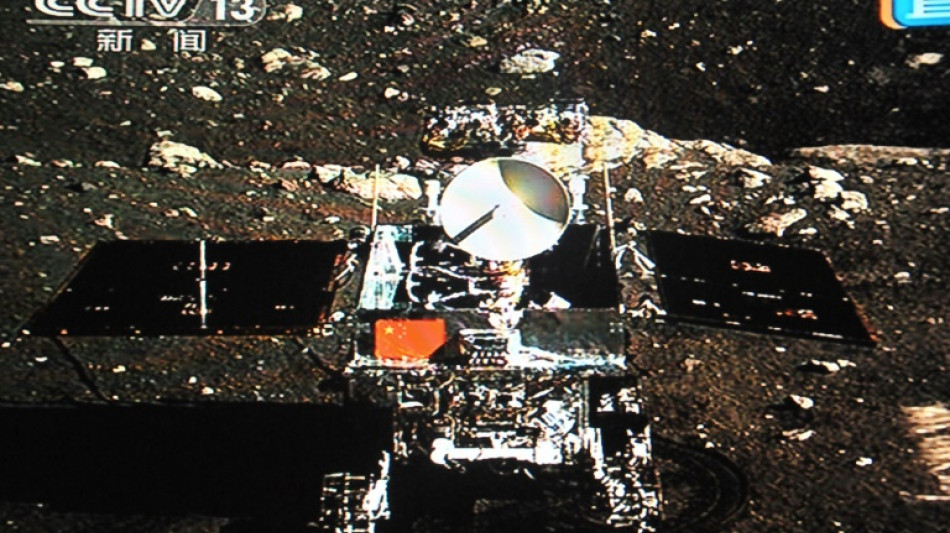
-
 France targets cheap Chinese goods with fee on packages
France targets cheap Chinese goods with fee on packages
-
Amnesty accuses Israel of 'live-streamed genocide' in Gaza

-
 Japan, Philippines leaders vow to deepen security ties
Japan, Philippines leaders vow to deepen security ties
-
AstraZeneca moves some production to US amid tariff threat

-
 Shadman's ton gives Bangladesh lead in 2nd Zimbabwe Test
Shadman's ton gives Bangladesh lead in 2nd Zimbabwe Test
-
Barca's Yamal: I admire Messi but don't compare myself to him

-
 Pfizer profits dip on lower Paxlovid sales
Pfizer profits dip on lower Paxlovid sales
-
French right-wing TV host fans talk of presidential bid

-
 Two men in court charged with 'moronic' felling of famed UK tree
Two men in court charged with 'moronic' felling of famed UK tree
-
Amnesty accuses Israel of 'live-streamed genocide' against Gazans

-
 Spotify posts record profit in first quarter
Spotify posts record profit in first quarter
-
Sciver-Brunt named as England women's cricket captain

-
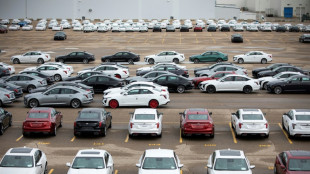 GM profits top estimates, but automaker reviewing outlook due to tariffs
GM profits top estimates, but automaker reviewing outlook due to tariffs
-
Stock markets edge up as Trump softens tariff pain for auto firms

-
 Pricier trainers? Adidas warns on US tariff impact
Pricier trainers? Adidas warns on US tariff impact
-
Spain, Portugal rule out cyberattack for massive blackout

-
 Suryavanshi, 14, dubbed India's next superstar after shattering records
Suryavanshi, 14, dubbed India's next superstar after shattering records
-
Power back in Spain, Portugal after massive blackout

-
 Pakistan says it shot down Indian drone along Kashmir border
Pakistan says it shot down Indian drone along Kashmir border
-
Cardinals run the media gauntlet ahead of conclave

-
 BP profit drops 70% amid pivot back to oil and gas
BP profit drops 70% amid pivot back to oil and gas
-
Iran says fire contained after deadly blast at key port
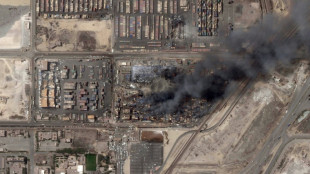
-
 Irish rappers Kneecap deny support for Hamas, Hezbollah
Irish rappers Kneecap deny support for Hamas, Hezbollah
-
Blackout plunges Spain into chaotic night of darkness

-
 Convicted cardinal confirms he will sit out conclave
Convicted cardinal confirms he will sit out conclave
-
Kashmiris fortify bunkers anticipating India-Pakistan crossfire

-
 Adidas warns US tariffs to push up prices
Adidas warns US tariffs to push up prices
-
Markets boosted as Trump softens tariff pain for auto firms

-
 Suryavanshi, 14, dubbed 'next superstar' after batting records tumble
Suryavanshi, 14, dubbed 'next superstar' after batting records tumble
-
Australian doubles player Purcell accepts 18-month doping ban

-
 Kashmir attack unites political foes in India, Pakistan
Kashmir attack unites political foes in India, Pakistan
-
Croatia hotel toasts dizzying century of stars, sovereigns and champagne

-
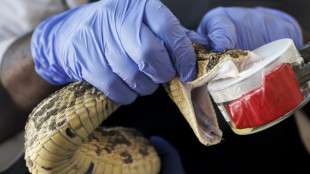 Kenya's desperate need for more snake antivenom
Kenya's desperate need for more snake antivenom
-
Les Kiss in frame with Wallabies set to name new coach

-
 Cavaliers scorch Heat, Warriors down Rockets in thriller
Cavaliers scorch Heat, Warriors down Rockets in thriller
-
Opposition wins Trinidad and Tobago election, returning Persad-Bissessar as PM

-
 Study sheds light on origin of Australia's odd echidna
Study sheds light on origin of Australia's odd echidna
-
France tries Syrian Islamist rebel ex-spokesman on war crime charges
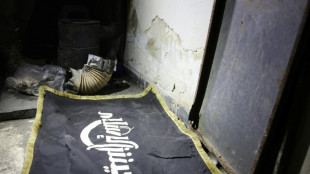
-
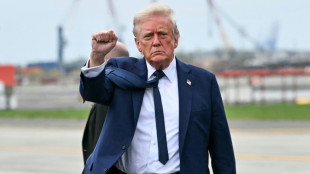 Trump boasts of 'fun' 100 days, but Americans disenchanted
Trump boasts of 'fun' 100 days, but Americans disenchanted
-
Elitist no more, caviar is turning casual

-
 Amnesty accuses Israel of 'live-streamed genocide' against Gaza Palestinians
Amnesty accuses Israel of 'live-streamed genocide' against Gaza Palestinians
-
Inter slump puts season at risk ahead of daunting Barca trip

-
 Power returns to most of Spain, Portugal after massive blackout
Power returns to most of Spain, Portugal after massive blackout
-
'I have hope': Vietnam Babylift survivor's search for birth mother

-
 US climate assessment thrown into doubt as Trump dismisses authors
US climate assessment thrown into doubt as Trump dismisses authors
-
Venezuelan president slams US over little girl's 'abduction'
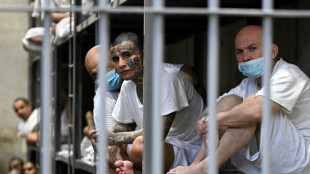
-
 Hard-right upstarts eye big gains in local UK polls
Hard-right upstarts eye big gains in local UK polls
-
Skulls, smoke and spirits: Thai ceremony for the unclaimed dead

-
 Canada's Carney: political newcomer who says he's best in a crisis
Canada's Carney: political newcomer who says he's best in a crisis
-
Cavaliers scorch Heat to seal series sweep


China's space programme: Five things to know
When Chang'e-3 became the first Chinese craft to land on the Moon 10 years ago, it kicked off nationwide celebrations -- and a decade of major successes for a rapidly accelerating space programme.
Since the December 14, 2013 landing, China has built a crewed space station, sent a robotic rover to Mars and become the first nation to make a controlled landing on the far side of the Moon.
Here are five things to know about China's space programme:
- A slow start -
Chinese leader Mao Zedong declared his nation's space ambitions soon after the Soviet Union launched the world's first satellite, Sputnik 1, in 1957.
It took 13 years for China to launch its first satellite Dong Fang Hong, or "The East is Red" -- named after the famous Communist revolutionary song it broadcast from orbit.
It was not until the late 1980s that the programme began to pick up pace, alongside China's ascent into the world's richest and most powerful nations.
Overseen by the military, its secretive space programme's goals became more ambitious. In 1992, it formally began a project to send humans into space.
- 'Taikonauts' -
More than three decades after its first satellite launch, on October 15, 2003, Yang Liwei became the first Chinese to travel into space, and an instant national hero.
With the success of his Shenzhou 5 mission, China became only the third nation after the United States and Russia to demonstrate the ability to launch humans into space.
In total, 20 Chinese astronauts have made the journey into space, including two women. State media have used the term "taikonaut" to describe China's spacefarers.
Many of them have journeyed to Tiangong, China's first long-term space station whose construction was completed last year.
Though much smaller than the International Space Station, it contains living quarters for a rotating crew, robotic arms and airlocks for conducting spacewalks.
- To the Moon -
China has also sent exploration missions to the Moon.
Named after the Moon goddess in Chinese folklore, Chang'e-3 touched down on the surface in 2013, making China only the third nation to successfully land there.
Two other milestones followed. In 2019, China became the first nation to make a controlled landing on the far side of the Moon with Chang'e-4.
A year later, Chang'e-5 brought the first lunar samples to Earth in more than 40 years.
Chinese space authorities have said they plan to land humans on the Moon by 2030, as well as build a lunar base.
- Mars and deep space -
One of the most spectacular successes of the Chinese space programme came in 2021 when its Tianwen-1 mission landed a rover named Zhurong on the surface of Mars.
China is only the second nation after the United States to put a robotic rover on the Red Planet.
Officials have said they aim to send a crewed mission there by 2033.
Aside from landers and orbiters, China is soon expected to launch a space telescope named Xuntian.
Orbiting close to the Tiangong space station, with which it can dock, Xuntian is expected to have a field of view far greater than NASA's Hubble telescope.
- Defence and prestige -
While China says it opposes the weaponisation of space, its policy makers have also identified space as critical to national defence and security.
Its military is a core player in the national space programme, and China is developing spy satellites, anti-satellite missiles and electronic warfare capabilities, according to the US military.
China "sees counterspace operations as a means to deter and counter a US intervention during a regional military conflict", the Pentagon said in a report to Congress this year.
And beyond the direct applications of these technologies, China considers success in space as a major driver of its image as a global power at home and abroad.
"National prestige is perhaps one of the most important, if not the most important, motives driving Chinese space ambitions," said Robert Hines, an assistant professor at the Georgia Institute of Technology in the United States.
"These symbols of increasing international status provide a powerful form of domestic propaganda."
S.Gregor--AMWN


